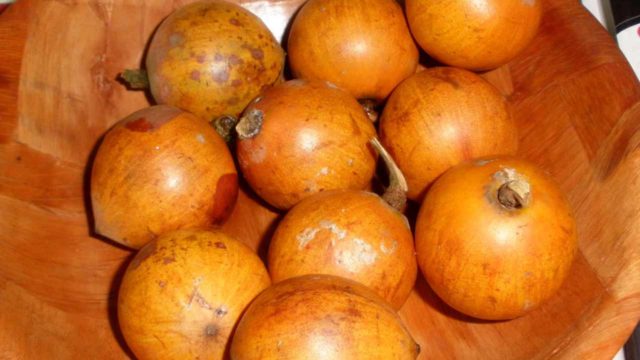Ethanolic extracts of African star apple or cherry have been validated in recent studies to damage fertility in men. CHUKWUMA MUANYA and ADAKU ONYENUCHEYA write.

New studies have shown that the ethanolic root bark extract of African cherry may damage fertility in men.African cherry is a plant, which has been used in traditional/alternative medicine in Nigeria to treat several health problems, as various parts of this herb have been proved to have a wide range of therapeutic effects.
The plant is a rich source of natural antioxidants, which have been established to promote health by acting against oxidative stress related disease such as; diabetics, cancer and coronary heart diseases.Its bark is used for the treatment of yellow fever and malaria while the leaf is used as an emollient and for the treatment of skin eruption, stomachache and diarrhea. The cotyledons from the seeds are used as ointments in the treatment of vaginal and dermatological infections in Western Nigeria and also possess anti-hyperglycemic and hypolipidemic effects, among other health benefits.
However, studies have shown that African cherry herbs can also have anti-fertility effects in men.Botanically called Chrysophyllum albidum, African star apple, which belongs to the plant family Sapotaceae is an edible tropical fruit known by various tribal names. It is called Utieagadava in Urhobo; Agbalumo in Yoruba; Udala in Ibo, Efik and Ibibio; Ehya in Igala, Agwaluma in Hausa tribes of Nigeria.
In southern Benin, it is called Azongogwe or Azonbobwe in local language.Several studies have been conducted to investigate the antifertility effect of the ethanolic root bark extract of C. albidum on the hormonal levels (pituitary-testicular axis) and caudal epididymal fluid parameters in wistar rats.
A study titled: “The effect of Chrysophyllum albidum fruit on testicular functions in rats” investigated the effects of C. albidum fruit methanol extract on the reproductive functions of male Wistar rats.Fifteen male Wistar rats were divided into three and received distilled water, which also served as control and extract respectively for 28 days via oral gavage.
The sperm count, motility, percentage sperm aberration, histology of testes and epididymides were examined by microscopy.The results showed the serum levels of luteinising hormone (LH), follicle‐stimulating hormone (FSH) and testosterone were quantified using ELISA. However, the sperm count significantly increased in, while the serum testosterone level decreased.
Findings from the study showed that the architecture of sections of testes and epididymides showed anomalies. C. albidum fruit adversely altered reproductive functions of male Wistar rat.Also, another study published in International Journal of Applied Research in Natural Products by Nigerian researchers validated the antifertility effect of extracts of African cherry in men.
The study is titled: “Antifertility Effects of Ethanolic Root Bark Extract of Chrysophyllum Albidum in Male Albino Rats.According to the researchers, the present study was conducted to investigate the antifertility activity of the ethanol root bark extract of Chrysophyllum albidum on sperm parameter and hormonal levels in rats.Eighteen male rats were divided into three groups of six animals each, as each group were administered distilled water that serve as control, ethanol root bark extract on a daily basis. The caudal epididymal sperm count; motility and sperm morphology were observed compared with the control.
The result showed that ethanol extract of the root bark of C. albidum suppresses the hormonal levels and sperm production in rats, according to the study.The researchers conclude that the study demonstrated that the root bark of ethanolic extract of C. albidum produces a pronounced inhibition of serum testosterone and gonadrophins concentration.
However, these extract had antifertility effect on the testes of albino wistar rats and could be further investigated for possibility of developing a cheap, acceptable and easy available male contraceptive.The researchers said: “The findings of the present study showed that the ethanolic root bark extract of C. albidum could significantly alter the fertility potential of male rats. The fact that there was significant increase in body weight
(p<0.05) on treated animals does not rule out the possibility of a systemic toxicity at the doses treated due to behavioral alterations observed within the treated groups which showed progressive decrease in agility. Furthermore, the significant increase in body weight (p<0.05) indicates that the extract may have toxic effect on the rats. The analysis of caudal epididymal fluids of these treated rats revealed a concomitant decrease in the sperm concentration which may be due to the inhibition in spermatogenesis which has been reflected here by the low count.” [ad] The researchers observed that the “present study also reveals a significant decrease in sperm motility, which focuses the direct effect of the extract on matured and stored sperm in epididymis, also increased abnormal sperm morphology.”Another study evaluated the effects of ethanolic leaf extract of Chrysophyllum albidum on hormones and sperm analysis of laboratory rats.
The study titled: “Ethanolic Leaf Extract of Chrysophyllum albidum on sperm analysis, hormonal profile, SOD and testicular histology of adult male wistar rats” was published in the Agriculture And Biology Journal of North America. The researchers in their findings showed that “C. albidum leave extract reduced serum levels of gonadotrophins probably by affecting hypothalamic- pituitary-gonadal axis. The treatment does not cause suppression of spermatogenesis but decrease the hormonal profile. The researchers from Faculty of Basic Medical Sciences, Madonna University, River State concluded that the “C. albidum leave extract reduced serum levels of gonadotrophins probably by affecting hypothalamic- pituitary-gonadal axis. The reduced levels of FSH, LH and T do not have effect on the testicular spermatogenesis for 21 days. However there was an increase in the SOD enzyme activities above the control level thereby improving its antioxidative capacity.”
